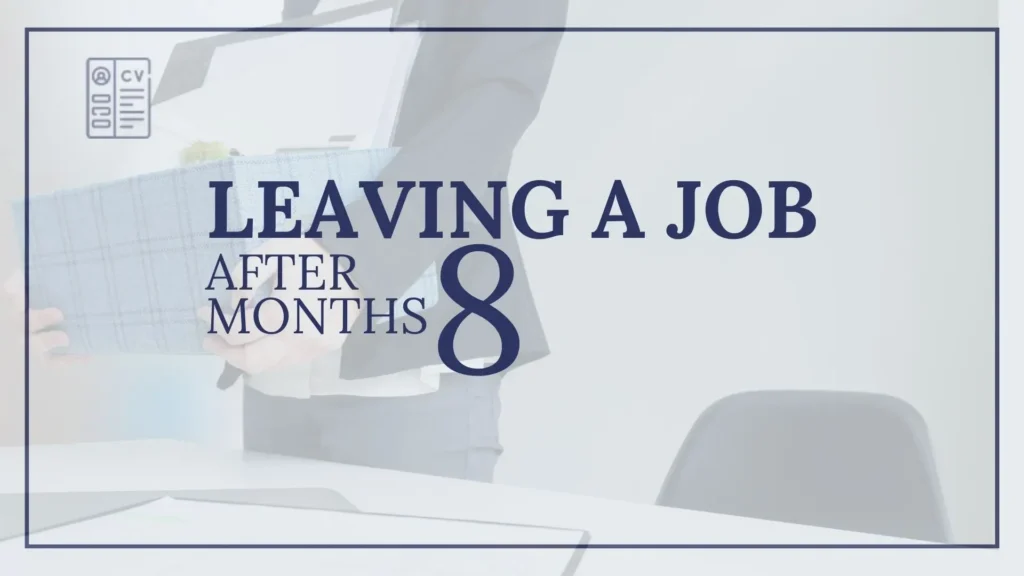Embarking on a new professional venture is an exciting time in your career, but what happens when you find yourself contemplating leaving that job after only 8 months? It’s not uncommon for individuals to encounter challenges or realize that a particular job is not the right fit for them. However, it’s important to carefully consider the potential implications of making such a decision. Leaving a job after a short tenure can impact your professional reputation, future job prospects, and even your financial stability.
In this blog post, we will discuss the risks and benefits of leaving a job after 8 months, as well as provide you with some guidance on how to navigate this decision. Whether you’re feeling unfulfilled in your current role or encountering difficulties, it’s crucial to weigh your options and make an informed choice that aligns with your long-term career goals.
Key Takeaways:
- Consider your reasons for leaving: It’s important to carefully consider why you want to leave a job after 8 months. Are the reasons valid and will they benefit your career in the long run?
- Be prepared for questions: When interviewing for a new job, be prepared to address why you are leaving your current position after such a short time. Honesty and tact are crucial in this situation.
- Reflect on the experience: Use the 8-month job stint as a learning opportunity. Reflect on what you have gained from the experience, and how it has helped you grow both personally and professionally.
Assessing Your Current Job Situation
One of the most important steps in leaving a job after 4 months or resigning after 8 months is to carefully assess your current job situation. This involves evaluating your job satisfaction, recognizing any signs that it’s time to move on, and considering the potential impact of leaving on your career and personal life.

Evaluating Your Job Satisfaction
Assessing your job satisfaction is crucial in determining whether it’s time to leave your current job. Consider factors such as your overall happiness, fulfillment, and sense of accomplishment in your role. Reflect on whether your current job aligns with your long-term career goals and whether you feel valued and appreciated in the workplace. If you find yourself feeling consistently dissatisfied or unfulfilled or being bullied, it may be a sign that it’s time to explore other opportunities.
Recognizing the Signs it’s Time to Move On
It’s important to recognize the signs that indicate it’s time to move on from your current job. These signs may include a toxic work environment, lack of growth opportunities, feeling undervalued, or experiencing persistent stress and burnout. Additionally, if you find yourself constantly questioning your decision to stay in your current job, it may be a clear indication that it’s time to consider other options. Ignoring these signs can have significant negative impacts on your mental and physical well-being, as well as hinder your overall career growth and satisfaction.
Preparing to Leave Your Job
The decision to leave a job after 8 months can be daunting, but with the right preparation, the transition can be smooth and empowering. The following are key steps you can take to prepare for your departure and set yourself up for success in your next endeavor.

Developing a Strategic Exit Plan
The first step in preparing to leave your job after 8 months is to develop a strategic exit plan. This should include tying up loose ends on current projects, documenting your job responsibilities and processes, and ensuring a smooth handover to your successor. By doing so, you will demonstrate professionalism and integrity in your departure, and leave a positive impression on your colleagues and superiors.
Handling the Financial Implications
Leaving a job after 8 months may have financial implications that need to be addressed. You should review your current benefits, such as health insurance and retirement savings, and plan for any gaps in coverage. Additionally, you may need to consider the impact on your income and budget accordingly. By planning for the financial implications of leaving your job, you can ensure a smooth transition while maintaining your financial stability.
Executing Your Departure
For whatever reason, you have decided to leave your job after 8 months. Now, it’s time to execute your departure from the company in a professional and respectful manner. This involves effectively communicating your decision and ensuring a smooth transition for all parties involved.

Communicating Your Decision Effectively
When it comes to communicating your decision to leave the company, it’s crucial to be clear, concise, and considerate. Schedule a meeting with your supervisor or HR to discuss your resignation in person. Clearly outline your reasons for leaving, and express your gratitude for the opportunities and experiences you’ve had during your time at the company. It’s important to maintain a positive and professional attitude, as you want to leave on good terms and potentially use your current employer as a reference in the future.
Ensuring a Smooth Transition for All Parties
As you prepare to leave your job after 8 months, it’s essential to ensure a smooth transition for both your coworkers and the company as a whole. Offer to assist with the handover of your responsibilities, provide detailed documentation, and make yourself available for any training or support that may be required during the transition period. This demonstrates your professionalism and commitment to leaving the company in a responsible manner.
Moving Forward After Departing
After leaving a job after 8 months, it’s normal to feel a range of emotions including relief, uncertainty, and even a bit of anxiety. However, it’s important to focus on moving forward and taking positive steps toward your future career goals. Here’s how you can navigate the aftermath of departing from a job and set yourself up for success in your next career move.

Learning from the Experience
Reflecting on your time at your previous job can provide valuable insights for your future career. Consider what you learned from the experience, both in terms of new skills and personal growth. Evaluate what aspects of the job did not meet your expectations or caused you to leave. This analysis can help you identify your priorities and preferences for your next role. Take note of any red flags that you may have ignored when you accepted the position, and use them as lessons learned for the future. Remember, every experience, whether positive or negative, can serve as a stepping stone to your next opportunity.
Strategizing Your Next Career Move
Now that you’ve gained insight from your previous job, you can use that knowledge to strategically plan your next career move. Consider what you truly want in a job, including the company culture, responsibilities, and work-life balance. Update your resume and LinkedIn profile to reflect your most recent experience, focusing on the skills and accomplishments that align with your career goals.
Be proactive in seeking out new opportunities and networking with professionals in your desired industry. By taking a strategic approach to your job search, you can increase the likelihood of finding a position that is a better fit for you.
Conclusion – Leaving A Job After 8 Months
The decision to leave a job after 8 months is not an easy one, but it can be the right move for your career. It’s important to reflect on your reasons for leaving and to ensure that you do so in a professional and respectful manner. By taking the time to consider your decision carefully, you can leave your current position on good terms and maintain positive relationships in your professional network. Remember, leaving a job after 8 months is not the end of the world – it can actually open up new opportunities for growth and development in your career.
People Also Asks – Leaving A Job After 8 Months
Is it okay to leave a job after 8 months?
In certain circumstances, leaving a job after 8 months may be necessary. It’s important to weigh the pros and cons and consider how it will affect your career in the long run.
How will leaving a job after 8 months impact my resume?
Leaving a job after a short period of time can raise red flags for potential employers. It’s important to be prepared to explain your reasons for leaving and highlight the valuable experience and skills gained during your brief tenure.
What are some valid reasons for leaving a job after 8 months?
Valid reasons for leaving a job after 8 months may include a toxic work environment, lack of growth opportunities, a better job offer, or personal reasons such as relocation or family obligations.
Should I discuss my short tenure at a job during interviews?
It’s important to be honest about your work history during interviews, but focus on the positive aspects of your experience and how it has contributed to your professional development. Highlight what you have learned and how it has prepared you for the next opportunity. Read our blogs to clear the interview.
How can I minimize the negative impact of leaving a job after 8 months?
To minimize the negative impact, ensure that you have a solid explanation for your short tenure and emphasize the skills and experience gained during your time at the job. Provide strong references and demonstrate your commitment and value to potential employers.

